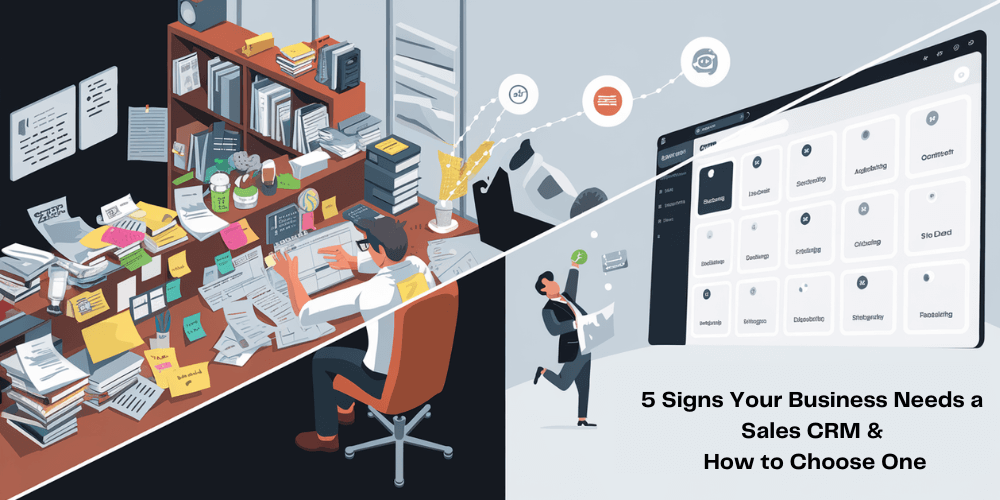
5 Signs Your Business Needs a Sales CRM (And How to Choose One)
Posted on February 10, 2025 | By admin
3 Min Read
Introduction
Are you struggling to keep track of leads, missing follow-ups, or losing sales due to disorganized data? If so, it might be time to invest in a Sales CRM for business. The right CRM for small businesses can streamline sales processes, improve team collaboration, and increase revenue.
In this blog, we’ll cover five key signs that indicate your business needs a Sales CRM and provide a CRM buying guide to help you choose the best one.
5 Signs Your Business Needs a Pro-Sales CRM
- Leads Are Falling Through the Cracks
You’re likely to miss out on potential sales if you manually track leads in spreadsheets, sticky notes, or scattered emails. A Pro-Sales CRM ensures every lead is captured, categorized, and followed up on.
How a CRM Helps:
- Recording lead interactions through a mobile app
- Sends follow-up reminders and notifications
- Tracks lead status in a centralized dashboard
- Your Sales Team Struggles with Follow-Ups
Without a structured follow-up system, sales reps may forget to reconnect with prospects, leading to lost opportunities.
How a CRM Fixes This:
- Automates visit follow-ups
- Sets up follow-up reminders
- Provides visibility into customer engagement
Example: A rep gets a reminder to call a lead who requested a follow-up on this date, increasing the chance of conversion
- Your Sales Data is Scattered and Unorganized
Do you find it difficult to access customer information when needed? A CRM for sales teams keeps all sales data—including contact details, previous interactions, and deal progress—in one place.
CRM Benefits:
- Quick access to sales history
- Organized pipeline tracking
- Customizable reporting dashboards
- Your Sales Team Lacks Collaboration & Efficiency
If your team struggles to share lead updates or duplicate efforts, productivity suffers. A Sales CRM for business fosters collaboration by keeping everyone on the same page.
How CRM Improves Teamwork:
- Allows multiple users to update lead status in real-time
- Provides visibility into team performance
- Ensures seamless handoffs between departments
Example: A sales rep can see that marketing has already engaged with a lead before making a pitch.
- You Can’t Accurately Track Sales Performance
Without proper analytics, it’s hard to measure sales effectiveness and make data-driven decisions. A Sales CRM automation system provides real-time insights into your pipeline and conversion rates.
CRM Insights Include:
- Sales forecasts & revenue predictions
- Lead conversion rates
- Performance tracking for individual reps
Example: You notice that leads from LinkedIn convert better than email leads, so you invest more in LinkedIn outreach.
How to Choose the Best Sales CRM for Your Business
- Identify Your Business Needs
- Do you need lead tracking?
- Are you looking for automation features?
- Do you require integrations with existing tools?
- Look for Key CRM Features
Must-have features:
- Contact & lead management
- Sales pipeline tracking
- Automated follow-ups
- Reporting & analytics
- Consider Scalability & Ease of Use
Your CRM should grow with your business and be easy for your team to adopt. Look for:
- A user-friendly interface
- Mobile access for on-the-go sales reps
- Customization options
- Check for Integrations with Your Existing Tools
Ensure the best CRM for small business integrates with your:
- Email marketing platforms (Microsoft 365, Mailchimp, HubSpot)
- Customer support software (Pro-Ticket, Zendesk, Freshdesk)
- Accounting software (Pro-Biz, QuickBooks, Xero)
- Take Advantage of Free Trials & Demos
Before committing, test different CRMs to find the best fit.
Pro Tip: Choose a CRM with a free trial to explore its features risk-free.
Final Thoughts
If you recognize any of these five signs, investing in a Sales CRM for business can help you organize leads, improve follow-ups, and drive revenue growth.
